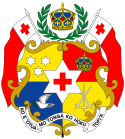Democratic Party of the Friendly Islands
Democratic Party of the Friendly Islands Paati Temokalati ʻa e ʻOtu Motu ʻAngaʻofa | |
|---|---|
| Abbreviation | DPFI |
| Leader | Semisi Sika |
| Founder | ʻAkilisi Pōhiva |
| Founded | September 2010 |
| Split from | Human Rights and Democracy Movement |
| Ideology | Reformism |
| Political position | Big tent[1] |
| Fale Alea | 3 / 26 |
 |
|---|
| Constitution |
| Administrative divisions |
The Democratic Party of the Friendly Islands (Tongan: Paati Temokalati ʻa e ʻOtu Motu ʻAngaʻofa) is a political party in Tonga. The party's leader at its foundation was 'Akilisi Pohiva.
The party was launched in September 2010, and included several sitting People's Representatives who were part of the Human Rights and Democracy Movement.[2] Its objectives upon foundation included government transparency and economic reform.[3]
The "Friendly Islands" are a name originally given to Tonga by Captain James Cook.[4]
2010 elections[edit]
The party contested all 17 people's seats in the 2010 elections,[2] winning 12 of them. Following the election, it secured the support of one independent and was seeking the support of two others – 'Aisake Valu Eke and Sunia Fili – by offering them cabinet posts.[5]
Following the elections, Niuas MP Sosefo Fe’aomoeata Vakata reportedly quit the party to become an independent and support a noble candidate as Prime Minister.[6]
References[edit]
- ^ "Tonga: Freedom in the World 2019 Report". Freedom House. Retrieved 16 December 2021.
- ^ a b "Another new political party emerges in Tonga as country prepares for 2010 elections". Radio New Zealand International. 6 September 2010. Retrieved 7 September 2010.
- ^ "Transparency on agenda in Tongan election". Australia Network News. 7 September 2010. Archived from the original on 7 July 2011. Retrieved 21 September 2010.
- ^ "Un nouveau parti à Tonga" Archived 7 July 2011 at the Wayback Machine, ABC Radio Australia (French), 8 September 2010
- ^ "Tonga election winners plan to co-opt two independents". Radio New Zealand International. Retrieved 27 November 2010.
- ^ "Nobles now more likely to form next Tonga government". Radio New Zealand International. 8 December 2010. Retrieved 9 December 2010.
